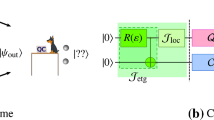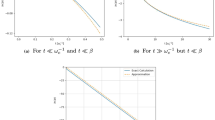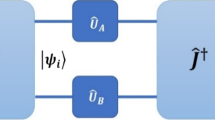Abstract
In the quantum version of prisoners’ dilemma, each prisoner is equipped with a single qubit that the interrogator can entangle. We enlarge the available Hilbert space by introducing a third qubit that the interrogator can entangle with the other two. We discuss an enhanced interrogation technique based on tripartite entanglement and analyze Nash equilibria. We show that for tripartite entanglement approaching a W-state, we calculate the Nash equilibria numerically and show that they coincide with the Pareto-optimal choice where both prisoners cooperate. Upon continuous variation between a W-state and a pure bipartite entangled state, the game is shown to have a surprisingly rich structure. The role of bipartite and tripartite entanglement is explored to explain that structure. As an application, we consider an evolutionary game based on our quantum game with a network of agents on a square lattice with periodic boundary conditions and show that the strategy corresponding to Nash equilibrium completely dominates without placing any restrictions on the initial set of strategies.







Similar content being viewed by others
Explore related subjects
Discover the latest articles and news from researchers in related subjects, suggested using machine learning.References
Meyer, D.A.: Quantum strategies. Phys. Rev. Lett. 82, 1052 (1999)
Piotrowski, E.W., Sladkowski, J.: An invitation to quantum game theory. Int. J. Theor. Phys. 42, 1089 (2003)
Brunner, N., Linden, N.: Connection between Bell non locality and Bayesian game theory. Nat. Commun. 4, 2057 (2013)
Flitney, A.P.: Aspects of quantum game theory. Ph.D. Thesis, University of Adelaide, Adelaide, Australia (January, 2005)
Iqbal, A., Toor, A.H.: Quantum mechanics gives stability to a Nash equilibrium. Phys. Rev. A 65, 022306 (2002)
Benjamin, S.C., Hayden, P.M.: Multiplayer quantum games. Phys. Rev. A 64, 030301 (2001)
Eisert, J., Wilkens, M., Lewenstein, M.: Quantum games and quantum strategies. Phys. Rev. Lett. 83, 3077 (1999)
Benjamin, S.C., Hayden, P.M.: Comment on ‘Quantum games and quantum strategies’. Phys. Rev. Lett. 87, 069801 (2001)
Dür, W., Vidal, G., Cirac, J.I.: Three qubits can be entangled in two inequivalent ways. Phys. Rev. A 62, 062314 (2000)
Li, Q., Iqbal, A., Chena, M., Abbott, D.: Quantum strategies win in a defector-dominated population. Physica A 391, 3316 (2012)
Pawela, Ł.: Quantum games on evolving random networks. Physica A 458, 179 (2016)
Solmeyer, N., Dixon, R., Balu, R.: Characterizing the Nash equilibria of a three-player Bayesian quantum game. Quantum Inf. Process. 16, 146 (2017)
Landsburg, E.S.: Nash equilibria in quantum games. Proc. Am. Math. Soc. 139, 4423 (2011)
Marinatto, L., Weber, T.: A quantum approach to static games of complete information. Phys. Lett. A 272, 291 (2000)
de Sousa, P.B.M., Ramos, R.V.: Multiplayer quantum games and its application as access controller in architecture of quantum computers. Quantum Inf. Process. 7, 125 (2008)
Zabaleta, O.G., Barrangú, J.P., Arizmendi, C.M.: Quantum game application to spectrum scarcity problems. Physica A 466, 455 (2017)
Zabaleta, O.G., Arizmendi, C.M.: Quantum dating market. Physica A 389, 2858 (2010)
Alexandre, G.M., da Silva, S.L.: Quantum Russian roulette. Physica A 392, 400 (2013)
Clark, K.B.: Bioreaction quantum computing without quantum diffusion. Neuroquantology 10, 646 (2012)
Turner, P.E., Chao, L.: Prisoner’s dilemma in an RNA virus. Nature 398, 441 (1999)
Pfeiffer, T., Schuster, S., Bonhoeffer, S.: Cooperation and competition in the evolution of ATP-producing pathways. Science 292, 504 (2001)
Frick, T., Schuster, S.: An example of the prisoner’s dilemma in biochemistry. Naturwissenschaften 90, 327 (2003)
Chettaoui, C., Delaplace, F., Manceny, M., Malo, M.: Games network and application to the plasminogen activator system. Biosystems 87, 136 (2007)
Acknowledgements
We wish to thank the anonymous reviewer for the suggestion of discussing an application of our game.
Author information
Authors and Affiliations
Corresponding author
Rights and permissions
About this article
Cite this article
Siopsis, G., Balu, R. & Solmeyer, N. Quantum prisoners’ dilemma under enhanced interrogation. Quantum Inf Process 17, 144 (2018). https://doi.org/10.1007/s11128-018-1915-9
Received:
Accepted:
Published:
DOI: https://doi.org/10.1007/s11128-018-1915-9




